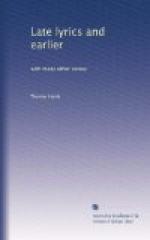“I feel some curse. O, five were
there?”
And wanly she swerved, and went away.
I followed sick: night numbed the air,
And dark the mournful moorland lay.
I cried: “O darling, turn your head!”
But never her face I viewed;
“O turn, O turn!” again I said,
And miserably pursued.
At length I came to a Christ-cross stone
Which she had passed without discern;
And I knelt upon the leaves there strown,
And prayed aloud that she might turn.
I rose, and looked; and turn she did;
I cried, “My heart revives!”
“Look more,” she said. I looked
as bid;
Her face was all the five’s.
All the five women, clear come back,
I saw in her—with her made one,
The while she drooped upon the track,
And her frail term seemed well-nigh run.
She’d half forgot me in her change;
“Who are you? Won’t
you say
Who you may be, you man so strange,
Following since yesterday?”
I took the composite form she was,
And carried her to an arbour small,
Not passion-moved, but even because
In one I could atone to all.
And there she lies, and there I tend,
Till my life’s threads unwind,
A various womanhood in blend —
Not one, but all combined.
Sir John was entombed, and the crypt was closed, and
she,
Like a soul that could meet no more the sight of the
sun,
Inclined her in weepings and prayings continually,
As his widowed one.
And to pleasure her in her sorrow, and fix his name
As a memory Time’s fierce frost should never
kill,
She caused to be richly chased a brass to his fame,
Which should link them still;
For she bonded her name with his own on the brazen
page,
As if dead and interred there with him, and cold,
and numb,
(Omitting the day of her dying and year of her age
Till her end should come;)
And implored good people to pray “Of their Charytie
For these twaine Soules,”—yea, she
who did last remain
Forgoing Heaven’s bliss if ever with spouse
should she
Again have lain.
Even there, as it first was set, you may see it now,
Writ in quaint Church text, with the date of her death
left bare,
In the aged Estminster aisle, where the folk yet bow
Themselves in prayer.
Thereafter some years slid, till there came a day
When it slowly began to be marked of the standers-by
That she would regard the brass, and would bend away
With a drooping sigh.
Now the lady was fair as any the eye might scan
Through a summer day of roving—a type at
whose lip
Despite her maturing seasons, no meet man
Would be loth to sip.
And her heart was stirred with a lightning love to
its pith
For a newcomer who, while less in years, was one
Full eager and able to make her his own forthwith,
Restrained of none.




